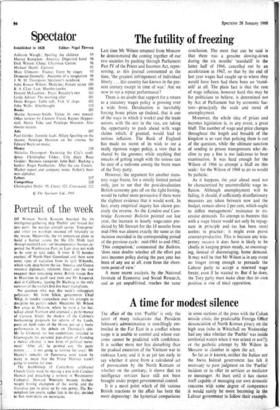The futility of freezing
Last time Mr Wilson returned from Moscow he demonstrated the coming together of our two societies by pushing through Parliament Part IV of the Prices and Incomes Act, repre- senting, as this journal commented at the time, 'the greatest infringement of individual liberty. ... this country has known in the pre- sent century except in time of war.' Are we now to see a repeat performance?
There is no doubt that support for a return to a statutory wages policy is growing over a wide front. Devaluation is inevitably forcing home prices up (indeed, that is one of the ways in which it works) and the trade unions, with the AEU in the van, are taking the opportunity to push ahead with wage claims which, if granted, would lead to serious inflation. The Bank of England has made no secret of its wish to see a really rigorous wages policy, a view that is shared by the gnomes; while anything that smacks of getting tough with the unions can be sure of a welcome among the brute mass of the Tory party.
However, the argument for another statu- tory wage freeze, for a strictly limited period Only, just to see that the post-devaluation British economy gets off on the right footing, would be rather more persuasive if there were the slightest evidence that it would work. In fact, every empirical inquiry has shown pre- cisely the reverse. As the London and Cam- bridge Economic Bulletin pointed out last year, the increase in hourly wage-rates pre- dicted by Mr Stewart for the 18 months from mid-1966 was almost exactly the same as the increase recorded in the corresponding period of the previous cycle : mid-1961 to end-1962. 'This comparison,' commented the Bulletin, 'does raise doubts whether all the effort put into incomes policy during the past year has been of any use at all, even from the short- term point of view.'
A more recent analysis, by the National Institute of Economic and Social Research, and as yet unpublished, reaches the same conclusion. The most that can be said is that there was a genuine slowing-down during the six months' standstill' in the latter half of 1966, cancelled out by an acceleration in 1967, so that by the end of last year wages had caught up to where they wonld have been had there been no 'stand- still' at all. The plain fact is that the rate of wage inflation, however hard this may be for politicians to believe, is determined not by Act of Parliament but by economic fac- tors—principally the scale and trend of unemployment.
Moreover, the whole idea of prices and incomes legislation is, in any event, a great bluff. The number of wage and price changes throughout the length and breadth of the kingdom is so vast that policing them is out of the question, while the ultimate sanction of sending to prison transgressors who de- cline to pay a fine is too ludicrous to bear examination. It was hard enough for the Wilson of 1966 to attempt a bluff on this scale : for the Wilson of 1968 to do so would be pathetic.
As it happens, the year ahead need not be characterised by uncontrollable wage in- flation. Although unemployment will be falling, it should, if sufficiently disinflationary measures are taken between now and the budget, remain above 2 per cent, which ought to stiffen managements' resistance to ex- cessive demands. To attempt to buttress this with a wage freeze would not only be repug- nant in principle and (as has been seen) useless in practice : it might even prove counter-productive. This is because any tem- porary success it does have is likely to be chiefly in keeping prices steady, so encourag- ing, instead of discouraging, home demand. It may well be that Mr Wilson is in any event no longer strong enough to persuade the Labour party to accept a renewed wage freeze, even if he wanted to. But if he does, the Tory party must make clear that its Own position js one of total opposition.


































 Previous page
Previous page